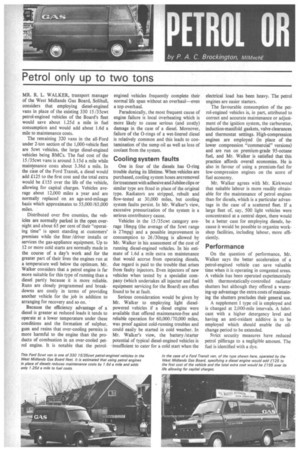PETROL OR
Page 92

If you've noticed an error in this article please click here to report it so we can fix it.
by P. A. C. Brockington, MIMechE
Petrol only up to two tons
MR. R. L. WALKER, transport manager of the West Midlands Gas Board, Solihull, considers that employing diesel-engined vans in place of the existing 330 15 /35cwt petrol-engined vehicles of the Board's fleet would save about 1.25d a mile in fuel consumption and would add about 1.6d a mile to maintenance costs.
The remaining 320 vans in the all-Ford under 2-ton section of the 1,000-vehicle fleet are 5cwt vehicles, the large diesel-engined vehicles being BMCs. The fuel cost of the 15 /35cwt vans is around 3.15d a mile while maintenance costs about 3.36d a mile. In the case of the Ford Transit, a diesel would add £125 to the first cost and the total extra would be £.155 over the life of the vehicle, allowing for capital charges. Vehicles average about 12,000 miles a year and are normally replaced on an age-and-mileage basis which approximates to 55,000/65,000 miles.
Distributed over five counties, the vehicles are normally parked in the open overnight and about 65 per cent of their "operating time" is spent standing at customers' premises while the fitter /driver installs or services the gas-appliance equipment. Up to 12 or more cold starts are normally made in the course of a day's work and for the greater part of their lives the engines run at a temperature well below the optimum. Mr. Walker considers that a petrol engine is far more suitable for this type of running than a diesel partly because it is more reliable. Runs are closely programmed and breakdowns are costly in terms of providing another vehicle for the job in addition to arranging for recovery and so on. •
Because the efficiency advantage of a diesel is greater at reduced loads it tends to operate at a lower temperature under these conditions and the formation of sulphur, gum and resins that over-cooling permits is more harmful to the engine than the products of combustion in an over-cooled petrol engine. It is notable that the petrol
engined vehicles frequently complete their normal life span without an overhaul—even a top overhaul.
Paradoxically, the most frequent cause of engine failure is local Overheating which is more likely to cause serious (and costly) damage in the case of a diesel. Moreover, failure of the 0-rings of a wet-linered diesel is relatively common and this leads to contamination of the sump oil as well as loss of coolant from the system.
Cooling system faults
One in four of the diesels has 0-ring trouble during its lifetime. When vehicles are purchased, cooling system hoses are removed for treatment with adhesive and Jubilee clips or similar type are fitted in place of the original type. Radiator's are stripped, rebuilt and flow-tested at 30,000 miles, but cooling system faults persist. In Mr. Walker's view, excessive pressurization of the system is a serious contributory cause.
Vehicles in the 15 /35cwt category average 18mpg (the average of the 5cwt range is 27mpg) and a possible improvement in consumption to 26 /30mpg is allowed by Mr. Walker in his assessment of the cost of running diesel-engined vehicles. In his estimate of 1.6d a mile extra on maintenance that would accrue from operating diesels, due regard is paid to the trouble that arises from faulty injectors. Even injectors of new vehicles when tested by a specialist company (which undertakes all injector and fuel equipment servicing for the Board) are often found to be at fault.
Serious consideration would be given by Mr. Walker to employing light dieselpowered vehicles if a diesel engine were available that offered maintenance-free and reliable operation for 60,000/70,000 miles, was proof against cold-running troubles and could easily be started in cold weather. In Mr. Walker's view, the battery /starter potential of typical diesel-engined vehicles is .insufficient to cater for a cold start when the electrical load has been heavy. The petrol engines are easier starters.
The favourable consumption of the petrol-engined vehicles is, in part, attributed to correct and accurate maintenance or adjustment of the ignition system, the carburetter, induction-manifold gaskets, valve clearances and thermostat settings. High-compression engines are employed (in place of the lower compression "commercial" versions) and are run on premium-grade 95-octane fuel, and Mr. Walker is satisfied that this practice affords overall economies. He is also in favour of using a premium-fuel for low-compression engines on the score of fuel economy.
Mr. Walker agrees with Mr. Kirkwood that suitable labour is more readily obtainable for the maintenance of petrol engines than for diesels, which is a particular advantage in the case of a scattered fleet. If a large fleet of, say, 500 light vehicles were concentrated at a central depot, there would be a better case for employing diesels, because it would be possible to organize workshop facilities, including labour, more efficiently.
Performance
On the question of performance, Mr. Walker says the better acceleration of a petrol-engined vehicle can save valuable time when it is operating in congested areas. A vehicle has been operated experimentally with thermostatically-controlled radiator shutters but although they offered a warming-up advantage the extra costs of maintaining the shutters precludes their general use.
A supplement I type oil is employed and is changed at 2,000-mile intervals. A lubricant with a higher detergency level and having an anti-oxidant additive is to be employed which should enable the oilchange period to be extended.
Strict security measures have reduced petrol pilferage to a negligible amount. The fuel is identified with a dye.
















































































































































